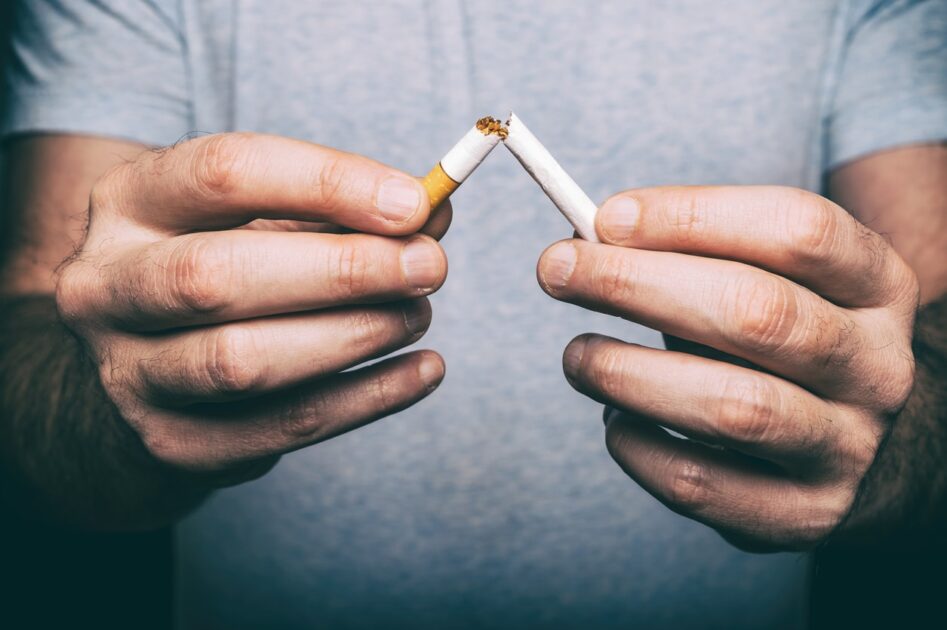How to quit smoking
Quitting smoking can be difficult, but it is possible. Get advice and support to quit smoking and stay off cigarettes.

Deciding to quit smoking is a process. You might start by thinking about stopping – this is when you know it’s bad for your health but don’t really feel ready to quit. After that you start to motivate yourself to stop and maybe even tell others about your plans. Finally,n you decide you’re ready to stop smoking.
Remember that quitting is a journey, and it can take time to reach the end goal. Try to be kind to yourself if you slip up or you’re finding it difficult. It is possible to quit and you will get there.
In this article:
- Why can it be so difficult to quit smoking?
- What effect does nicotine have on the body?
- How will my body react when I quit smoking?
- How to quit smoking successfully
- How to handle setbacks
Why can it be so difficult to quit smoking?
Cigarettes contain nicotine, which is a highly addictive substance. When you think of all the reasons not to smoke, it seems strange that anyone would continue with such an expensive and unhealthy habit.
Nicotine is why it’s so hard to quit smoking. Nicotine is also contained in vapes or e-cigarettes, which is why vaping is not necessarily the best way to quit smoking – instead, it allows you to continue with your nicotine addiction. Other methods for quitting like Nicotine Replacement Therapy (NRT) are currently considered more effective.
What effect does nicotine have on the body?
Nicotine works extremely fast. When inhaled, it stimulates the central nervous system, increasing the body’s heart rate, blood pressure and metabolism.
When you smoke you will experience the effects of nicotine in 10-20 seconds. The effects of nicotine last 2 hours – the body gets rid of it very quickly. After 2 hours have passed your body will crave more nicotine – creating the cycle of dependence.
When inhaled, nicotine temporarily relieves these cravings, while also strengthening the need to smoke more. Each cigarette smoked strengthens the desire for the next one. It’s a difficult circle but it can be broken.
Can I quit while I’m still young?
The earlier a young person starts smoking, the higher their dependence to nicotine will be. This is because nicotine causes changes to your brain chemistry. However, the younger you are when you quit, the better the chance you will stay smoke free for good, so this is a great time to stop smoking.
How will my body react when I quit smoking?
You may feel pretty bad for a while when you first give up smoking because your body is experiencing nicotine withdrawal.
Signs of nicotine withdrawal include:
- Headaches
- Mood swings
- Feeling tired or cranky
- Feeling dizzy or lightheaded
- Coughing as your lungs try to clear out toxins
- Constipation
- Low moods
- Feeling irritated
- Difficulty sleeping
Withdrawal can be difficult, but there are ways to manage and get through it. The effects from withdrawal are temporary, and they are a sign that your body is healing. Find out more about dealing with withdrawal symptoms.
How to quit smoking successfully
Quitting can be difficult, but it is possible. There are a few things you can do to increase your chances of success.
Make a quit plan
Think carefully about quitting and write down your reasons so that you feel more prepared. You can stick these on your wall as a reminder and to keep you motivated. Pick a date to quit and stick to it.
It can also help to keep track of when you smoke, the things that trigger your cravings for a cigarette, and certain patterns like time of day, so that you can be prepared for those moments when they arise after you quit.
You can get a free, personalised quit plan through the HSE QUIT service.
Avoiding smoking triggers
If you pay attention to your smoking patterns and triggers and write these down before you quit, you can make an effort to avoid these things after you quit. It can also help you to put a plan in place so you know what to do when faced with one of your triggers.
For example, if you always smoke at a certain time of day, every day, make a plan to do a different activity at that time to break the habit and distract yourself.
Find out more about dealing with smoking triggers.
Find support
Getting support greatly increases your chances of quitting smoking. Ask your friends and family to encourage you, and if they smoke too, ask them not to smoke in front of you. If you’ve got a friend who smokes, ask them to quit with you so that you’ve got each other for support.
Having support can also be really helpful on hard days when you’re feeling low and want to turn to the cigarettes. It’s good to try and find ways to manage your feelings, and reach out to someone to talk.
Remember you can also get support from your GP or access phone or live chat support at the HSE QUIT service.
Consider smoking cessation treatments
NRT or Nicotine Replacement Therapy is treatment that can reduce or remove the physical symptoms of smoking withdrawal. It is known to greatly increase your chances of quitting successfully. You can chat to your doctor, pharmacist or HSE Quit Team to see if NRT is right for you.
Learn how to manage your cravings
Having a strategy for how you will deal with cravings will make it easier to overcome them. Some people find the ‘5 Ds’ helpful:
- Distract yourself by focusing on something else
- Delay doing anything about your craving until the urge passes
- Deep breathing – take 20 deep breaths
- Drink a glass of cold water or fruit juice
- Don’t dwell on it – try your best not to get caught up in thoughts about your cravings
Cravings might last up to five minutes but will then start to go away again. Get active as soon as the craving hits: walk around, make yourself a drink, get on your telephone and chat to someone.
Find out more about handling cravings.
How to handle setbacks
If you slip up and have a cigarette, try not to be too hard on yourself. Remind yourself again of why you’re quitting and get back on track. It can sometimes take a couple quit attempts to quit for good. Take this as a learning opportunity so that you can be prepared for whatever the trigger was next time.
If you’ve been finding it really hard to stay on track, talk to your GP or the HSE QUIT service about treatment options like NRT. If you’re already on NRT but it hasn’t worked, they can explore other medication options with you.
Mind yourself
Treat yourself right by exercising, eating well, getting rest and rewarding yourself for a job well done. Quitting an addiction is difficult work. Treat yourself at the end of each week, fortnight or month. Take one day at a time: every day without a cigarette is a success.
If quitting is getting you down, remember that these feelings are temporary – they usually get better within about four weeks. Find out more about looking after your mental health when you quit smoking.
Get help and support to QUIT smoking
- Talk to your GP or pharmacist about NRT.
- Visit Quit.ie for tips on how to stop smoking.
- Call the Quitline on Freephone 1800 201 203 to talk to someone who understands and can help you quit.
- Head to the Quit.ie Facebook page to read stories from others who have quit smoking and to share your own.






